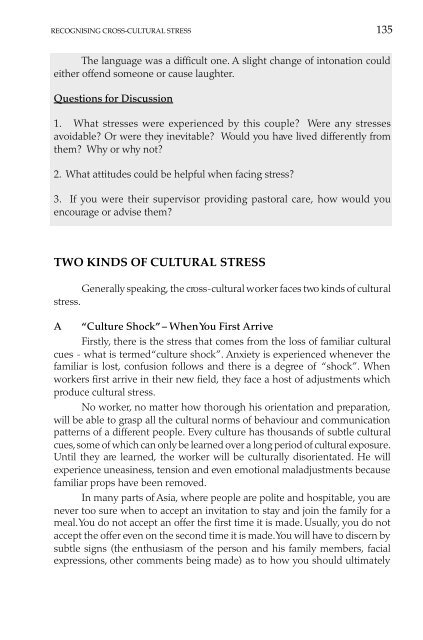WHEN YOU CROSS CULTURES - World Evangelical Alliance
WHEN YOU CROSS CULTURES - World Evangelical Alliance
WHEN YOU CROSS CULTURES - World Evangelical Alliance
Create successful ePaper yourself
Turn your PDF publications into a flip-book with our unique Google optimized e-Paper software.
RECOGNISING <strong>CROSS</strong>-CULTURAL STRESS<br />
The language was a difficult one. A slight change of intonation could<br />
either offend someone or cause laughter.<br />
Questions for Discussion<br />
135<br />
1. What stresses were experienced by this couple? Were any stresses<br />
avoidable? Or were they inevitable? Would you have lived differently from<br />
them? Why or why not?<br />
2. What attitudes could be helpful when facing stress?<br />
3. If you were their supervisor providing pastoral care, how would you<br />
encourage or advise them?<br />
TWO KINDS OF CULTURAL STRESS<br />
Generally speaking, the cross-cultural worker faces two kinds of cultural<br />
stress.<br />
A “Culture Shock” – When You First Arrive<br />
Firstly, there is the stress that comes from the loss of familiar cultural<br />
cues - what is termed “culture shock”. Anxiety is experienced whenever the<br />
familiar is lost, confusion follows and there is a degree of “shock”. When<br />
workers first arrive in their new field, they face a host of adjustments which<br />
produce cultural stress.<br />
No worker, no matter how thorough his orientation and preparation,<br />
will be able to grasp all the cultural norms of behaviour and communication<br />
patterns of a different people. Every culture has thousands of subtle cultural<br />
cues, some of which can only be learned over a long period of cultural exposure.<br />
Until they are learned, the worker will be culturally disorientated. He will<br />
experience uneasiness, tension and even emotional maladjustments because<br />
familiar props have been removed.<br />
In many parts of Asia, where people are polite and hospitable, you are<br />
never too sure when to accept an invitation to stay and join the family for a<br />
meal. You do not accept an offer the first time it is made. Usually, you do not<br />
accept the offer even on the second time it is made. You will have to discern by<br />
subtle signs (the enthusiasm of the person and his family members, facial<br />
expressions, other comments being made) as to how you should ultimately

















